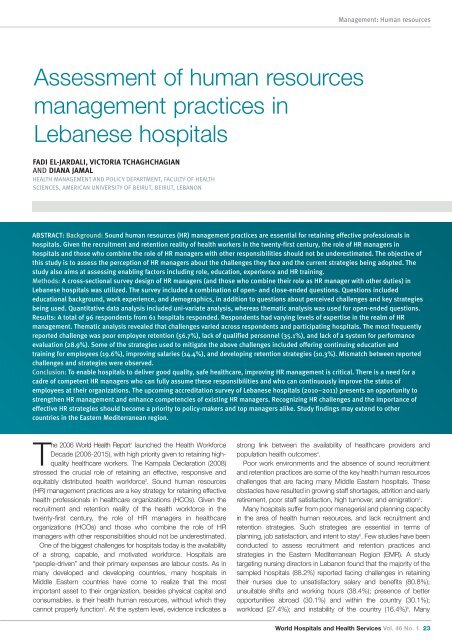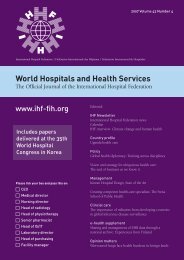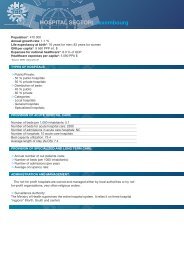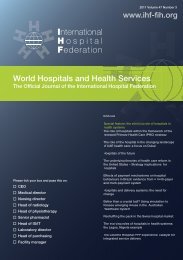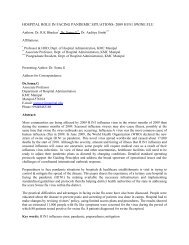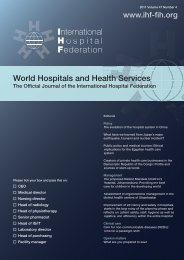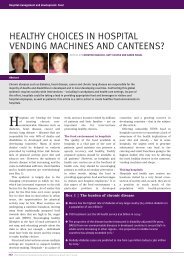vol46.1 LR.pdf - International Hospital Federation
vol46.1 LR.pdf - International Hospital Federation
vol46.1 LR.pdf - International Hospital Federation
Create successful ePaper yourself
Turn your PDF publications into a flip-book with our unique Google optimized e-Paper software.
Management: Human resources<br />
Assessment of human resources<br />
management practices in<br />
Lebanese hospitals<br />
FADI EL-JARDALI, VICTORIA TCHAGHCHAGIAN<br />
AND DIANA JAMAL<br />
HEALTH MANAGEMENT AND POLICY DEPARTMENT, FACULTY OF HEALTH<br />
SCIENCES, AMERICAN UNIVERSITY OF BEIRUT, BEIRUT, LEBANON<br />
ABSTRACT: Background: Sound human resources (HR) management practices are essential for retaining effective professionals in<br />
hospitals. Given the recruitment and retention reality of health workers in the twenty-first century, the role of HR managers in<br />
hospitals and those who combine the role of HR managers with other responsibilities should not be underestimated. The objective of<br />
this study is to assess the perception of HR managers about the challenges they face and the current strategies being adopted. The<br />
study also aims at assessing enabling factors including role, education, experience and HR training.<br />
Methods: A cross-sectional survey design of HR managers (and those who combine their role as HR manager with other duties) in<br />
Lebanese hospitals was utilized. The survey included a combination of open- and close-ended questions. Questions included<br />
educational background, work experience, and demographics, in addition to questions about perceived challenges and key strategies<br />
being used. Quantitative data analysis included uni-variate analysis, whereas thematic analysis was used for open-ended questions.<br />
Results: A total of 96 respondents from 61 hospitals responded. Respondents had varying levels of expertise in the realm of HR<br />
management. Thematic analysis revealed that challenges varied across respondents and participating hospitals. The most frequently<br />
reported challenge was poor employee retention (56.7%), lack of qualified personnel (35.1%), and lack of a system for performance<br />
evaluation (28.9%). Some of the strategies used to mitigate the above challenges included offering continuing education and<br />
training for employees (19.6%), improving salaries (14.4%), and developing retention strategies (10.3%). Mismatch between reported<br />
challenges and strategies were observed.<br />
Conclusion: To enable hospitals to deliver good quality, safe healthcare, improving HR management is critical. There is a need for a<br />
cadre of competent HR managers who can fully assume these responsibilities and who can continuously improve the status of<br />
employees at their organizations. The upcoming accreditation survey of Lebanese hospitals (2010–2011) presents an opportunity to<br />
strengthen HR management and enhance competencies of existing HR managers. Recognizing HR challenges and the importance of<br />
effective HR strategies should become a priority to policy-makers and top managers alike. Study findings may extend to other<br />
countries in the Eastern Mediterranean region.<br />
The 2006 World Health Report 1 launched the Health Workforce<br />
Decade (2006-2015), with high priority given to retaining highquality<br />
healthcare workers. The Kampala Declaration (2008)<br />
stressed the crucial role of retaining an effective, responsive and<br />
equitably distributed health workforce 2 . Sound human resources<br />
(HR) management practices are a key strategy for retaining effective<br />
health professionals in healthcare organizations (HCOs). Given the<br />
recruitment and retention reality of the health workforce in the<br />
twenty-first century, the role of HR managers in healthcare<br />
organizations (HCOs) and those who combine the role of HR<br />
managers with other responsibilities should not be underestimated.<br />
One of the biggest challenges for hospitals today is the availability<br />
of a strong, capable, and motivated workforce. <strong>Hospital</strong>s are<br />
“people-driven” and their primary expenses are labour costs. As in<br />
many developed and developing countries, many hospitals in<br />
Middle Eastern countries have come to realize that the most<br />
important asset to their organization, besides physical capital and<br />
consumables, is their health human resources, without which they<br />
cannot properly function 3 . At the system level, evidence indicates a<br />
strong link between the availability of healthcare providers and<br />
population health outcomes 4 .<br />
Poor work environments and the absence of sound recruitment<br />
and retention practices are some of the key health human resources<br />
challenges that are facing many Middle Eastern hospitals. These<br />
obstacles have resulted in growing staff shortages, attrition and early<br />
retirement, poor staff satisfaction, high turnover, and emigration 5 .<br />
Many hospitals suffer from poor managerial and planning capacity<br />
in the area of health human resources, and lack recruitment and<br />
retention strategies. Such strategies are essential in terms of<br />
planning, job satisfaction, and intent to stay 6 . Few studies have been<br />
conducted to assess recruitment and retention practices and<br />
strategies in the Eastern Mediterranean Region (EMR). A study<br />
targeting nursing directors in Lebanon found that the majority of the<br />
sampled hospitals (88.2%) reported facing challenges in retaining<br />
their nurses due to unsatisfactory salary and benefits (80.8%);<br />
unsuitable shifts and working hours (38.4%); presence of better<br />
opportunities abroad (30.1%) and within the country (30.1%);<br />
workload (27.4%); and instability of the country (16.4%) 6 . Many<br />
World <strong>Hospital</strong>s and Health Services Vol. 46 No. 1 23


